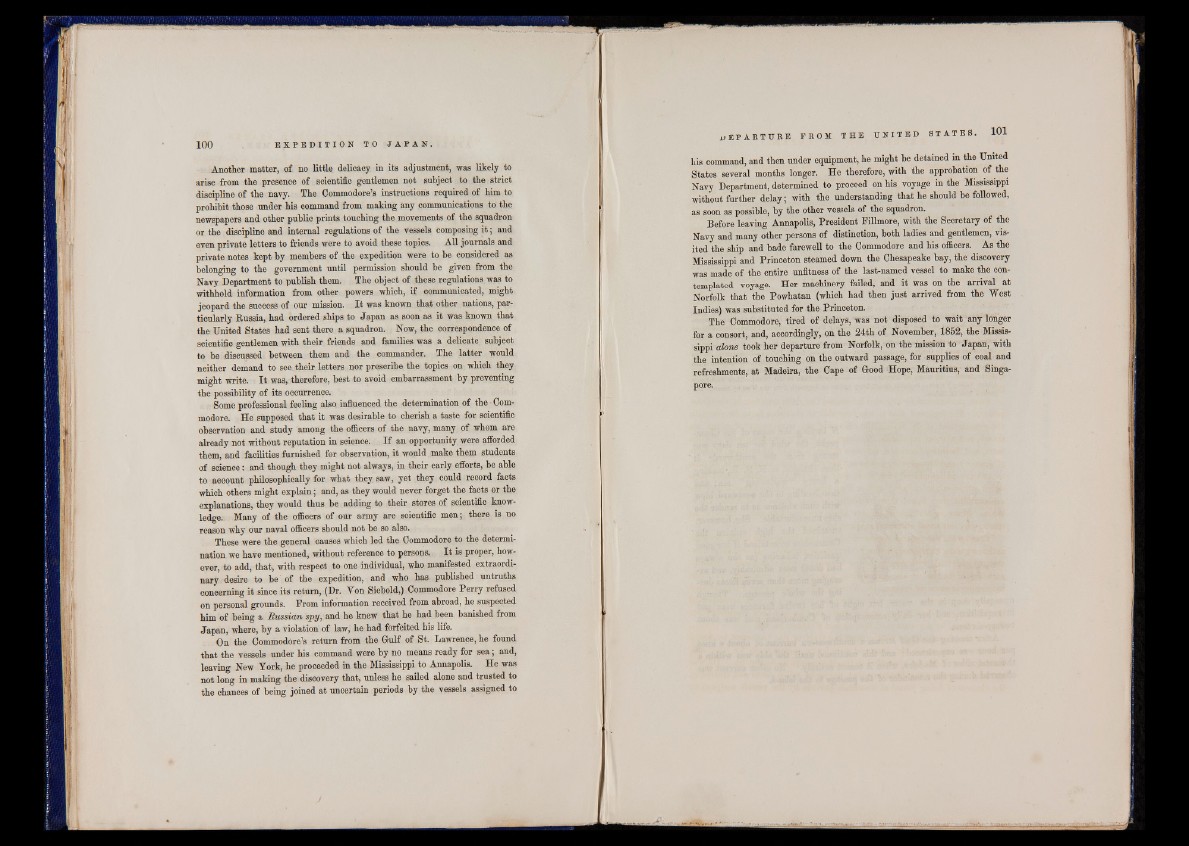
Another matter, of no little delicacy in its adjustment, was likely to
arise from the presence of scientific gentlemen not subjeot to the strict
discipline of the navy. The Commodore’s instructions required of him to
prohibit those under his command from making any communications to the
newspapers and other public prints touching the movements of the squadron
or the discipline and internal regulations of the vessels composing it; and
even private letters to friends were to avoid these topics. All journals and
private notes kept by members of the expedition were to be considered as
belonging to the government until permission should be given from the
Navy Department to publish them. The object of these regulations was to
withhold information from other powers which, if communicated, might
jeopard the suceess of our mission. I t was known that other nations, particularly
Russia, had ordered ships to Japan aB soon as it was known that
the United States had sent there a squadron. Now, the correspondence of
scientific gentlemen with their friends and families was a delicate subjeot
to be discussed between them and the commander. The latter would
neither demand to see their letters nor prescribe the topics on which they
might write. I t was, therefore, best to avoid embarrassment by preventing
the possibility of its occurrence.
Some professional feeling also influenced the determination of the • Commodore.
He supposed that it was desirable to cherish a taste for scientific
observation and study among the officers of the navy, many of whom are
already not without reputation in science. I f an opportunity were afforded
them, and facilities furnished for observation, it would make them students
of science: and though they might not always, in their early efforts, be able
to account philosophically for what they saw, yet they could record facts
which others might explain; and, as they would never forget the facts or the
explanations, they would thus be adding to their stores of scientific knowledge.
Many of the officers of our army are scientific men; there is no
reason why our naval officers should not be so also.
These were the general causes which led the Commodore to the determination
we have mentioned, without reference to persons. I t is proper, however,
to add, that, with respect to one individual, who manifested extraordinary
desire to be of the expedition, and who has published untruths
concerning it since its return, (Dr. Yon Siebold,) Commodore Perry refused
on personal grounds. Prom information received from abroad, he suspected
him of being a Russian spy, and he knew that he had been banished from
Japan, where, by a violation of law, he had forfeited his life.
On the Commodore’s return from the Gulf of St. Lawrence, he found
that the vessels under his command were by no means ready for sea; and,
leaving New York, he proceeded in the Mississippi to Annapolis. He was
not long in making the discovery that, unless he sailed alone and trusted to
the chances of being joined at uncertain periods by the vessels assigned to
e E P A E T T E E F R OM T H E U N I T E D S T A T E S . 101
his command, and then under equipment, he might be detained in the United
States several months longer. He therefore, with the approbation of the
Navy Department, determined to proceed on his voyage in the Mississippi
without further delay; with the understanding that he should be followed,
as soon as possible, by the other vessels of the squadron.
Before leaving Annapolis, President Fillmore, with the Secretary of the
Navy and many other persons of distinction, both ladies and gentlemen, visited
the ship and bade farewell to the Commodore and his officers. As the
Mississippi and Princeton steamed down the Chesapeake bay, the discovery
was made of the entire unfitness of the last-named vessel to make the contemplated
voyage. Her machinery failed, and it was on the arrival at
Norfolk that the Powhatan (which had then just arrived from the West
Indies) was substituted for the Princeton.
The Commodore, tired of delays, was not disposed to wait any longer
for a consort, and, accordingly, on the 24th of November, 1852, the Mississippi
alone took her departure from Norfolk, on the mission to Japan, with
the intention of touching on the outward passage, for supplies of coal and
refreshments, at Madeira, the Cape of Good Hope, Mauritius, and Singapore.